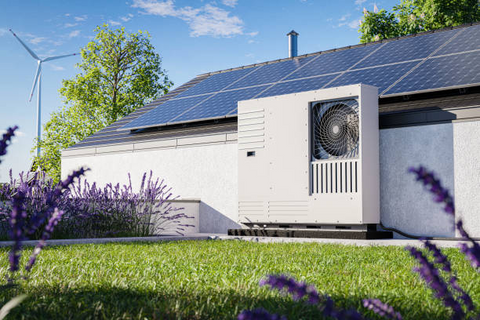Heat pumps have become a vital component of HVAC systems in numerous households, serving both heating and cooling purposes. These heating systems are ubiquitous and found in homes worldwide. However, it's only recently that experts have begun to examine the environmental implications of air-to-water heat pumps. So, how exactly does your heat pump system affect the environment, and what steps can you take to enhance your home's eco-friendliness?

A Green Revelation
Air-to-water heat pumps operate on a simple yet ingenious principle: they harness the latent heat present in the outdoor air to warm water, which is then circulated through radiators, underfloor heating systems, or even to provide hot water for domestic use. This process essentially magnifies the heat extracted from the air, making it a highly efficient means of heating.
Reducing Carbon Footprints
One of the most significant contributions of air-to-water heat pumps to the environment is their ability to drastically reduce carbon emissions. Unlike traditional heating systems that rely on fossil fuels, heat pumps use electricity to transfer heat, consuming significantly less energy in the process. This reduced energy consumption translates into lower greenhouse gas emissions, making them a vital player in the fight against climate change.
High Efficiency & Low Waste
Air-to-water heat pumps have another compelling advantage: their high efficiency. For every unit of electricity they consume, they can provide several units of heat energy, typically at an efficiency rate of 300% to 500%. This efficient conversion of electricity into heat significantly reduces energy waste, further minimizing its environmental impact.
Adaptive to Renewable Energy
These heat pumps are highly adaptable to renewable energy sources, like solar panels or wind turbines. By pairing them with clean energy systems, homeowners can achieve a near-zero carbon footprint for their heating needs, exemplifying the marriage of technology and sustainability.
Eco-Friendly Home Upgrades
One remarkable aspect of air-to-water heat pumps is their compatibility with existing heating systems. This means homeowners can retrofit their homes with these systems, replacing older, less efficient boilers or furnaces and immediately reducing their carbon emissions.
Cost Savings - Environmental and Financial Benefits
Embracing eco-friendly technology often comes with financial benefits. Although initially pricier than traditional systems, air-to-water heat pumps offer long-term savings through reduced energy bills and lower maintenance costs. The financial incentive to adopt these systems further fuels their adoption.
Conclusion - Paving the Way for Greener Homes
Air-to-water heat pumps are more than a heating solution; they're a sustainable way of life. Their reduced carbon emissions, energy conservation, and compatibility with renewable energy sources make them a vital tool in the global pursuit of eco-friendly living. As we seek ways to minimize our environmental impact, air-to-water heat pumps are a beacon of hope, paving the way for greener homes and a brighter, cleaner future.

